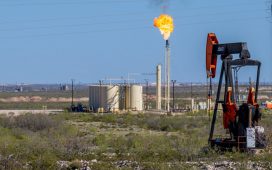An environmental activit cuts an earth-painted orange to mark Earth Overshoot Day, the date when we (all of humanity) have used more from nature than our planet can renew in the entire year. (Photo credit should read TOBIAS SCHWARZ/AFP/Getty Images)
Getty
Today, July 29, is Earth Overshoot Day, which means humanity has already used nature’s resource budget for the entire year. More simply, humanity is using nature 1.75 times faster than our planet’s ecosystems can regenerate, hugely compromising future resource security.
This is according to Global Footprint Network, an international sustainability organization behind the Ecological Footprint measure and accompanying Footprint Calculator for anyone to calculate their own personal Overshoot Day.
In the days leading up to this year’s Earth Overshoot Day, Global Footprint Network launched the beta version of their #MoveTheData Solutions Map, developed by startup Mapotic, to allow anyone to add and champion solutions which can help push the date of Earth Overshoot Day back each year.
Research by the organization and their partner Schneider Electric finds that the if Earth Overshoot Day were to move back five days each year, humanity would reach “one-planet compatibility” by 2050, meaning nature would be used in line with its regeneration. Cutting fossil fuel emissions by 50% would move the date 93 days; and if 100% of existing building and industry infrastructure were equipped with efficiency and renewable energy technologies, the date would move at least 21 days.
As the map is increasingly populated, it is clear there are many governmental and community efforts focused on the climate crisis in areas such as cities, energy, and food, but there has also been an increase over recent years in startups focusing on sustainability-led missions and technologies. If, as Global Footprint Network’s research shows, the future dates of Earth Overshoot Day can indeed be moved back, the biggest question is surely: what is needed to ensure this happens without delay?
The recent rise of deeptech startups means that bringing the most advanced science-based solutions out of the laboratory and into the market is happening faster and more efficiently. In order for deeptech startups to effectively combat humanity’s reliance on fossil fuels and depletion of resources, though, funding and focus are required to overcome the so-called “valley of death,” which research-intensive efforts can struggle to financially overcome without long-term thinking investors and effective go-to-market strategy.
Alistair Owen, associate director of energy at Deep Science Ventures, a science venture-building fund and accelerator based in London, says it is key for startups to deeply focus on problems which can move the needle, to complement larger corporate and government efforts. “Startups need to focus on unblocking systemic bottlenecks instead of doubling down on incremental technology. For example, increasing the rate of battery tech research and development by 1000 times, rather than spending hundreds of millions of dollars to try and scale manufacturing, when billions are really required.”
Translating complex technologies from the laboratory to the market, though, is no cheap endeavor. And along with focusing on the right problem to tackle, in order to keep costs under control and business operations as streamlined as possible, savvy, forward-facing investors across both the private and public sector are required.
In the clean energy space, access to investment at the government level is very dependent on the country in which startups and corporates are based. The first half of 2019 saw global investment in clean energy fall to its lowest levels since 2013, according to Bloomberg New Energy Finance, slipping 14% to $117.6 billion. The global fall comes as a result of dramatic changes in China’s solar and wind subsides policies, but Europe and the US also experienced reduced clean energy investment overall. However, some countries seem to be going in the other direction, with Spain’s clean energy investment tripling in the first half of 2019, and the U.K.’s investment surging by 35%.
Sam Cryer, founder of Durham-based high-performance insulation startup Thermulon, says exciting investor appetite can be a difficult task: “As long as oil and gas are cheap and CO2 holds almost zero value, starting new tech ventures in the climate space will be commercially hard. With deep science companies often being capital expenditure heavy, more patient and high-risk capital would massively increase the chances of ventures getting off the ground.”
July 29th is 2019’s Earth Overshoot Day, which means humanity has already used nature’s resource budget for the entire year.
Global Footprint Network
Cryer added that collaboration between scientists, startups and larger businesses to keep up with the pace of climate change: “We don’t have time to try and go it alone and therefore fostering multiple collaborations on a single project can increase speed to market massively. To this end, we need new mechanisms for big corporates and startups to rapidly prototype together.”
Beyond energy and building infrastructure efforts, the agriculture industry is one of the biggest contributors to the climate crisis, with its widespread emissions, deforestation and inefficient land management. Agrifood tech startups, however, are attracting much interest and investment not just because of their more sustainable approaches, but their commercial opportunity worldwide. In 2018, an AgFunder report found that over $6.9 billion had been invested in upstream technologies such as biotech, farm robotics, innovative food, and bioenergy and biomaterials, an almost 45% increase since 2017.
If Earth Overshoot Day is to move back next year, the year after that, and beyond, the potential in deeptech startups across energy, food, cities, and materials must be realized with a combination of funding and corporate and research collaboration. If science is to come out of the lab at a rate fast enough to have an effect on the climate crisis, and indeed a rate fast enough to avert future resource security disasters, investors, governments, and businesses must see today—July 29, 2019—as an opportunity for positive change, as well as a stark reminder of humanity’s effect on planet Earth.








